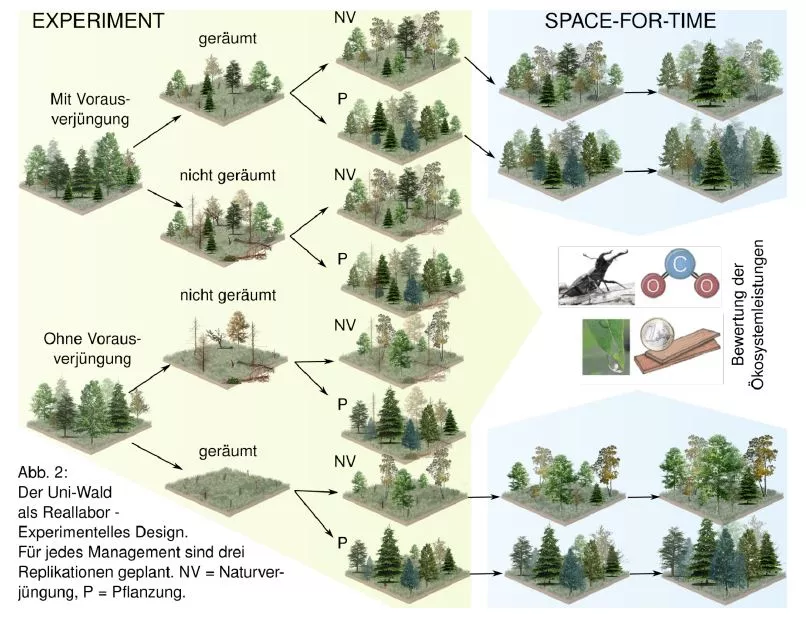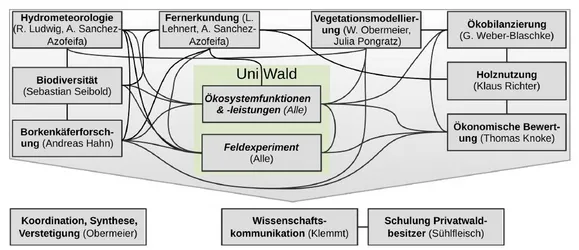| Persons in charge: | Weber-Blaschke, G.; Lange, A.; Cummings, M. |
|---|---|
| Funded by: | |
| Cooperation partners: | Gräflich Arco-Zinneberg'sches Forstamt, Bayerische Landesanstalt für Wald und Forstwirtschaft (LWF), Bayerische Waldbauernschule (WBS), Ludwig-Maximilians-Universität und Technische Universität Dresden |
REGULUS -LabForest
University forest as real laboratory for sustainable regeneration management in climate change
Climate change is increasingly threatening forestry yields in Europe, as well as the susceptibility of forests to large-scale disturbances, e.g. by bark beetles. Especially after the drought summers in 2018 and 2019, this resulted in a substantial increase in disturbances in the forests. At the same time, an increase in demand for wood products and other forest ecosystem services (e.g. climate regulation) is forecasted, which further increases the demands on resilient forestry.
The overarching goal of this project is to set up a real-world laboratory in the university's own forestry operation at the Ludwig Maximilian University (LMU) near Landshut in close collaboration with research groups from the School of Life Science at the Technical University of Munich (TUM) and the Institute for Forest Botany and Forest Zoology at the Technical University of Dresden (TUD). The core of a three-year research and development phase of the project is a real experiment that, for the first time, makes it possible to compare the forestry and logging effects of various management options in connection with disturbances and to evaluate them in combination with their effects on biodiversity and important ecosystem services. The central methodological component is the close connection of in situ measurement data via modern remote sensing data with process and data-based hydrological models, dynamic vegetation models, economic models as well as wood technology data and life cycle assessment models.
In the consolidation phase, the project aims to promote the transfer of the scientific results of the real laboratory into practice on several levels by creating an educational facility. In addition to university teaching with the strengthening of interdisciplinary teaching formats, the exchange of young scientists and the transfer into forestry practice through the practical partners Forest Farmers' School (WBS) and the Bavarian State Institute for Forestry and Forestry (LWF) as well as the associated partner Bavarian State Forestry (BaySF) will be implemented. The university intends to continue the medium to long-term existence of the educational institution.
You find further information to the Research Initiative REGULUS and all granted regional project groups and projects here: REGULUS

Research Institutes & Knowledge Transfer:
- Department für Geographie, LMU München (Prof. Dr. Lukas Lehnert: Projektleitung; Dr. Wolfgang Obermeier: Leitung der Innovationsgruppe,
Prof. Dr. Ralf LudwigProf. Dr. Julia Pongratz) - Professur für Waldinventur und nachhaltige Nutzung, TU München (Prof. Dr. Thomas Knoke)
- Lehrstuhl Holzwissenschaft TU München (Prof. Dr. Klaus Richter, Prof. Dr. Gabriele Weber-Blaschke)
- Professur für Forstzoologie, TU Dresden (Prof. Dr. Sebastian Seibold)
- Abteilung Waldschutz, Bayerische Landesanstalt für Wald und Forstwirtschaft (LWF)
- Abteilung Waldbau, Bayerische Landesanstalt für Wald und Forstwirtschaft (LWF)
Practice Actor & Knowledge Transfer
- Gräflich Arco-Zinneberg'sches Forstamt, Inhaberin Anna Theresa Maria Gräfin v.u.z. Arco-Zinneberg
- Bayerische Staatsforsten (BaySF) (Dr. Sebastian Höllerl)
- Bayerische Waldbauernschule (Kai Sühlfleisch)
- Forstverwaltung Gotzing (Jan Linder)
Associated Partner
- Department of Earth and Atmospheric Sciences, University of Alberta, Canada (Prof. Dr. Arturo Sanchez-Azofeifa)
